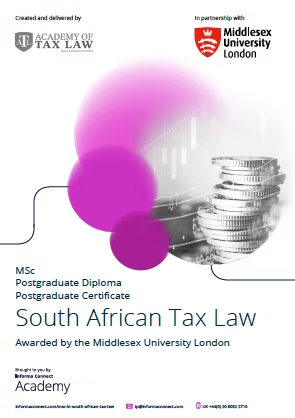POSTGRADUATE DIPLOMA IN SOUTH AFRICAN TAX LAW
The Postgraduate Diploma comprises Stage 1, foundational SATL covered on the PG-Cert page, and Stage 2. This award equips you to identify and analyse developments across South African taxation and spot emerging or existing risk areas. You will evaluate positions from both taxpayer and SARS perspectives, weighing strengths and weaknesses, and produce clear written or oral opinions grounded in core legislation, case law, and sound reasoning and established interpretive principles.
Duration
22 months, part-time
Credits
12 University Credits
Effort
6–10 hrs/week average*
*Student dependent
Assessment
8x Coursework Assessments,
4x Module Assessments
Format
Online – Recorded lectures, Prescribed Reading, Live Q&As
Award
PG-Diploma, Middlesex
University

PG-Diploma (Stage 1+2) Overview
Exit Qualification: Postgraduate Diploma, or progress to Stage 3 for MSc (Master’s)

This award consists of 2 Stages. For the Postgraduate Diploma award Stage 1 & Stage 2 must be completed, consisting of 120 credits in total.
- Each stage contains two modules:
- Stage 1 – General Principles & Tax Law and Corporations, with 30 credits awarded per module.
- Stage 2 (detailed below) – Advanced Tax Law & Application of SA Tax Law, with 30 credits awarded per module.
- The learning will address important issues within the sector, drawing on key points, to ensure you gain a thorough understanding of the topics.
- Students must complete and successfully pass the assigned programme work assessments and the final exam at the end of each stage to claim their award.
- Pre-recorded academic lectures will be released each week, accompanied with the prescribed reading, any additional reading and/or research, as required. Directed reading will relate to provided case law, and will also include reading from legislation, books, articles, academic and professional journals.
- The learning from the lectures will be emphasised with an array of case studies, practice examples and resources, to challenge thinking in a practical context. Engaging activities on the discussion forum, the use of quizzes, polls and other forum built-in activity will further validate the learning objectives.
- Each main topic will end with a live-online tutorial, conducted by the lecturers. The tutorials are designed to be interactive, providing students with the opportunity to ask questions and to consider issues from different perspectives.
The student who progresses from Stage 1 now has a basic understanding of South African Tax Law. The main aim of this module is to extrapolate South African Tax Law in more detail with particular attention to:
- Full analysis of the concept of capital receipts, identifying and understanding relevant case law
- Understanding the distinction between capital receipts and revenue (taxable) receipts.
- A comprehensive look at Capital Gains Tax, including the core components and tax treatment of capital gains.
- Understanding the function of CGT and fully unpacking schedule 8 to the Income Tax Act.
- Unpacking the Common Law Doctrine of simulation, its application, and its current place in South African tax law.
Learning Outcomes
On successfully completing this module, the student will be able to:
Course Content
- Possess the ability to analyse the concept of capital receipts and identify the consequence of each receipt.
- Explicate the core components of Capital Gains Tax (CGT) and understand its role within the tax system to effectively apply its treatment in practice to individuals, companies and trusts.
- Apply and advise on the role of the doctrine of simulation as it relates to transactions that SARS challenges
- Determine modern developments in the tax system and how they affect the implementation of the law and case law in practice.
Knowledge (understanding)
- Fully comprehend the concept of capital receipt through the analysis of relevant case law, as well as a comprehensive understanding of the distinction between capital receipts and receipts on revenue account.
- Critically assessing the consequences of each receipt.
- Understand, identify and apply the core components of Capital Gains Tax (CGT) regime, its role within the tax system, and the taxation thereof as it relates to individuals, companies and trusts.
- Understand, apply and advise on the role and application of the doctrine of simulation as it relates to transactions that SARS challenges on the basis that they are simulated, and the effect thereof.
- Understanding how modern developments in the tax system affect the implementation of the law and case law in practice.
Skills (competencies)
- Ability to analyse the concept of capital receipts and identify the consequence of each receipt.
- Explicate the core components of CGT and understand its role within the tax system to effectively apply its treatment in practice.
In this module, Dividends Tax and Donation Tax are unpacked through the analysis of the relevant sections within the Income Tax Act.
Another important aspect that is considered in the broader tax system is general anti-avoidance, which is dealt with in-depth.
International Tax and trusts within the context of South African Tax Law are also addressed in detail. And to close the module as well as the PG-D portion of the programme, Financial Instruments are covered, with a thorough analysis of the Income Tax Act relating to financial instruments.
Learning Outcomes
On successfully completing this module, the student will be able to:
Course Content
- Critically evaluate sections 54 – 64 of the Income Tax Act, along with the relevant case law to interpret how Dividends Tax or Donations Tax affects transactions.
- Interpret and evaluate, when and how to apply anti-avoidance measures to transactions.
- Broadly analyse International Tax law, but more specifically, double-tax treaties and how they apply to cross-border transitions within the context of South African Tax Law.
- Explicate the specific provisions within the Income Tax Act to facilitate transactions by (or with) trust entities.
- Explore the Income Tax Act and analyse how specific financial instruments may affect transactions and to apply in practice.
Knowledge (understanding)
- Identify instances of Dividends Tax and Donations tax, and apply the relevant legislative provisions thereto in advising clients on transactions, structures, disputes with SARS and an assessment of the merits in the position of the respective parties.
- Recognise and interpret what Anti-Avoidance measures entail within the context of South African Tax Law.
- Understand, apply and advise on aspects of International Taxation and double taxation agreements and how these apply to cross-border transactions.
- Understand, apply and advise on the tax position peculiar to trusts with reference to specific provisions of the Income Tax Act.
- Apply and advise on specialised provision
Skills (competencies)
- Critically evaluate sections 54-64 of the Income Tax Act, along with the relevant case law to interpret how Dividends Tax or Donations Tax affects transactions.
- Interpret and evaluate when and how to apply anti-avoidance measures to transactions.
- Broadly analyse International Tax law, but more specifically, double tax treaties and how they apply to cross-border transitions within the context of South African Tax Law.
- Explicate the specific provisions within the Income Tax Act in order to facilitate transactions by (or with) trust entities.
- Ability to draw on the Income Tax Act to analyse how specific financial instruments may affect transactions and to apply in practice.

The assessment scheme consists of the following, (per module):
- Coursework Assessment 1 (20 Marks)
- Coursework Assessment 2 (20 marks)
- Final Assignment (60 Marks)
- Total – 100 Marks
To qualify for the Postgraduate Diploma (or progress to Stage 3) the candidate must complete both modules.
Download Course Brochure
PG-Cert | PG-Dip | MSc


